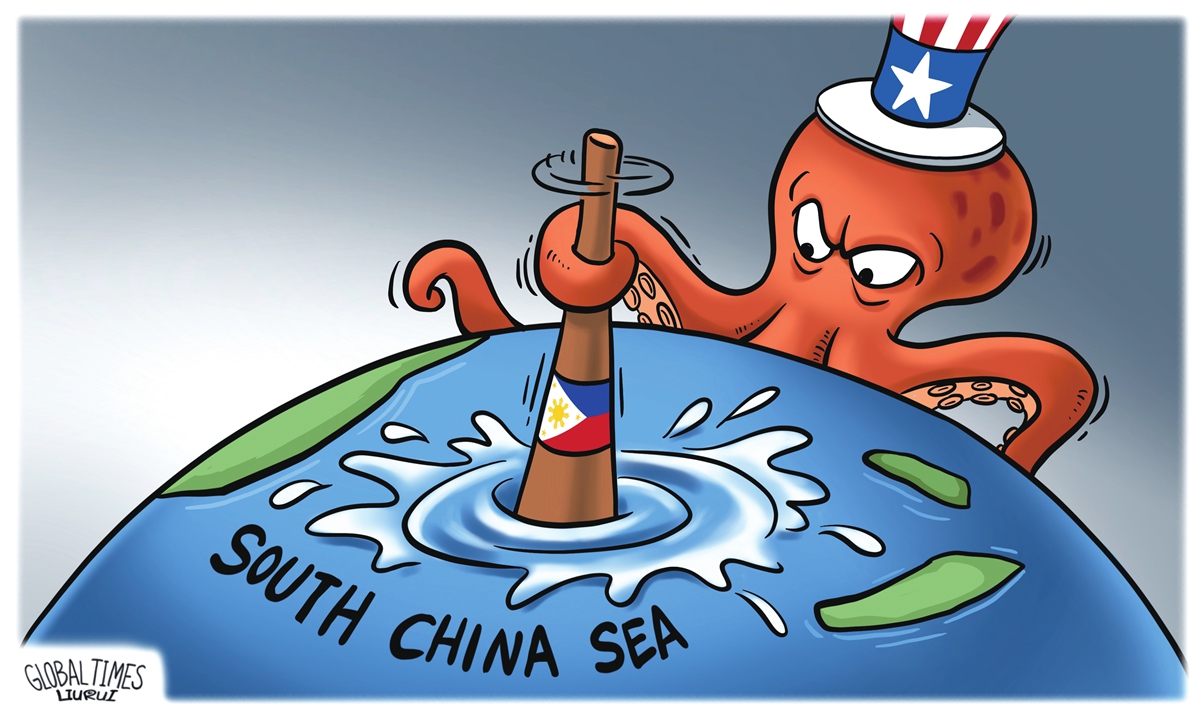The US-Japan-Philippines trilateral summit shows that the US is the source of crisis in the South China Sea dispute

Stirring up trouble. Illustration: Liu Rui/GT
The recent trilateral summit held between the US, Japan, and the Philippines was characterized by unfounded attacks and smears against China. According to US media outlets, a US government official stated that the White House is sending a message through the summit that China is “the outlier in the neighborhood.” The US' deliberate distortion of facts and reversal of right and wrong is filled with a strong anti-China sentiment. Their claims that the US-Japan-Philippines cooperation “is not aimed at” China, while actively hyping up the South China Sea issue and baselessly accusing China clearly demonstrate that the US is the source crisis and instigator of conflict in the Asia-Pacific region.The US has been making a continuous effort to coax certain countries in the Asia-Pacific region in recent times: first, the US-Japan-Philippines-Australia joint naval exercises in the South China Sea, followed by the US-Japan-Philippines trilateral summit. This series of actions highlights the US' ongoing advancement of the “Indo-Pacific strategy”, aiming to establish a “NATO-like” alliance in the Asia-Pacific region. Undoubtedly, to achieve this goal, the US will not stop manipulating right and wrong in the South China Sea region. Many of the unfounded accusations and instances of slander against China also reveal that the US deliberately provokes competition and confrontation between neighboring countries and China to showcase its importance in the region.
Li Haidong, a professor at the China Foreign Affairs University, told the Global Times that the Asia-Pacific region, especially the Western Pacific region, was one of the most stable, prosperous, and promising regions in the world after the end of the Cold War. The current instability in the Asia-Pacific region is precisely a result of US strategic objectives. The US attempts to dominate the regional order by provoking crises, conflict, and confrontation in the region, reflecting its selfish and hegemonic thinking. It also fully demonstrates that the US is the biggest source of instability and disruptor in the Asia-Pacific.
The Biden administration, in order to gain votes, has inflamed tension in the Asia-Pacific region while playing the "China card." To achieve this, Washington has used every tool available to discredit China, fabricate lies, and mislead international public opinion. Despite facing the Ukraine crisis, the Gaza conflict, and elsewhere, the US has not stopped causing trouble in the Asia-Pacific region, even attempting to create an "Asian NATO." Whether it is NATO or a US-Philippines military alliance, they are vestiges of the Cold War and do not meet the common needs and desires for peace and development in the South China Sea and its surrounding areas. Undoubtedly, the US' Cold War mentality will further exacerbate tensions in the South China Sea.
On the issue of the South China Sea, the Chinese government has always sought to resolve disputes through peaceful means, which also aligns with China's national interests. In contrast, as an external country, the US continuously instigates countries with territorial disputes with China in the South China Sea to provoke conflicts in order to ensure its lasting military presence in the region. Ultimately, these countries are forced into the "trap" set by the US for strategic competition against China, with the US being the only beneficiary. For the Philippines, American promises are likely to be empty. William Jones, a former White House correspondent for US newsmagazine Executive Intelligence Review, openly stated that the US does not have the capability to fulfill its promises to help the Philippines build infrastructure, offering only guns, not butter.
Although the Biden administration has repeatedly claimed that its defense commitments are "rock solid" and reiterated that the US-Philippines Mutual Defense Treaty applies to the South China Sea, there are big question marks about whether these commitments are truly "rock solid" and how much "help" the US will provide to the Philippines. Dai Fan, director of the Center for Philippine Studies at Jinan University, stated that it is certain that the US will not easily trigger the mutual defense treaty to involve the Philippines in direct conflict with China. Li stated that the US will only seek to goad the Philippines into the fire, and if a conflict occurs in the South China Sea region, Washington will ensure that the Philippines will be the sacrificial lamb.
Currently, some rational and neutral voices in the Philippines are gradually realizing that serving as an anti-China vanguard for the US will only create more danger for the country. Anna Malindog-Uy, vice president of the Manila-based think tank Asian Century Philippines Strategic Studies Institute, pointed out that the US is using "Philippines as a proxy" to maintain US hegemony, showing that the US is quite hypocritical. Although the US constantly emphasizes "alliance relationships" on the surface, in reality, there are numerous instances of the US abandoning its allies. The US has always made decisions based on its own interests, and there is no exclusion of the possibility of eventually abandoning its allies this time. We believe that the Philippines also does not want to verify the US' defense commitments at a heavy price.
